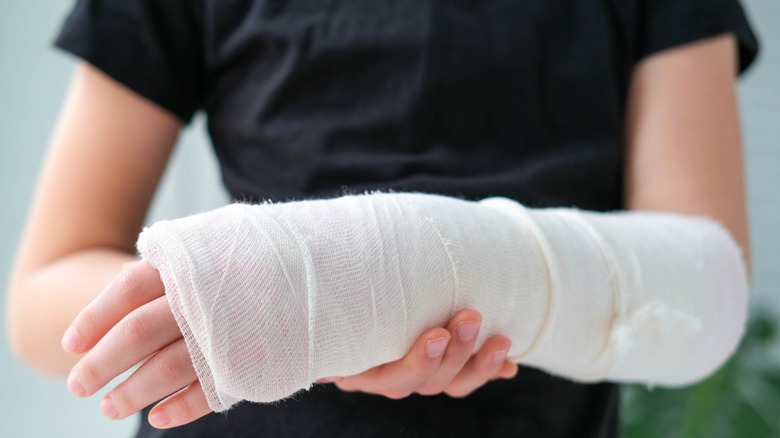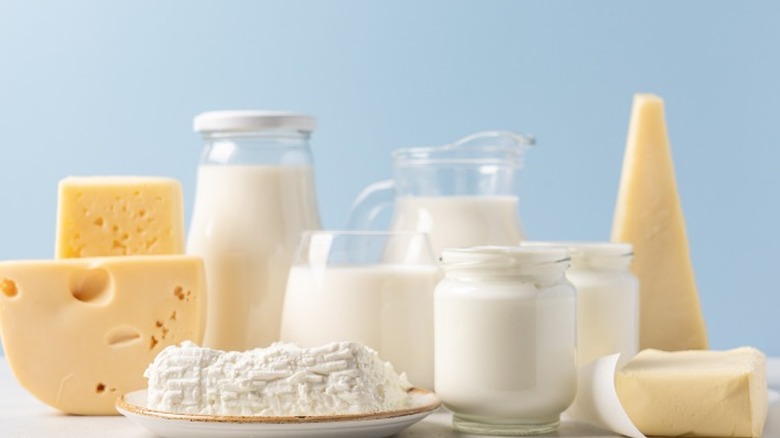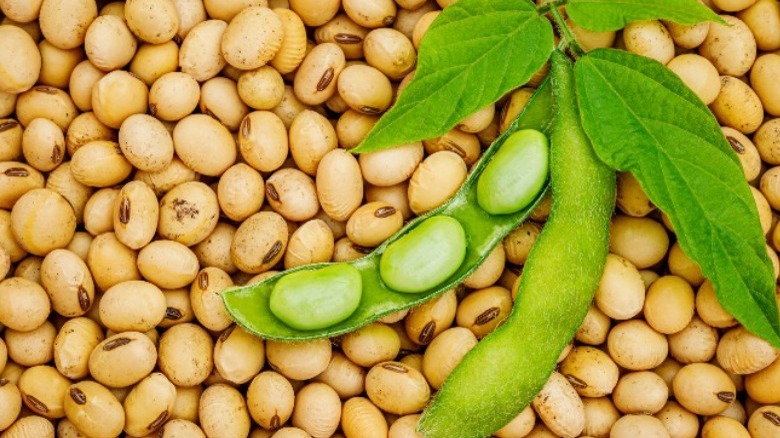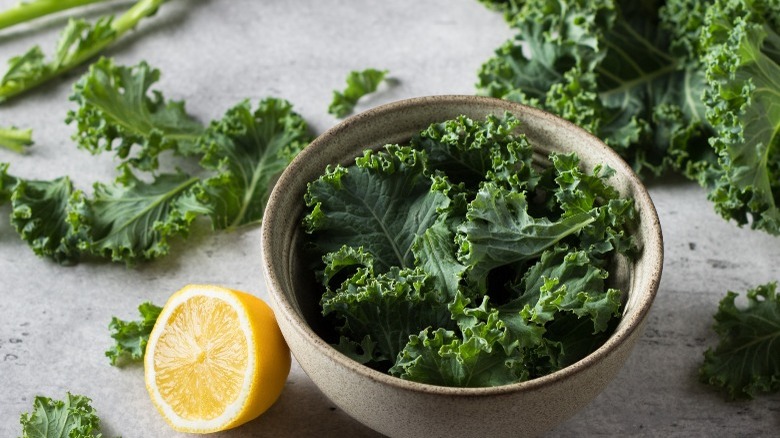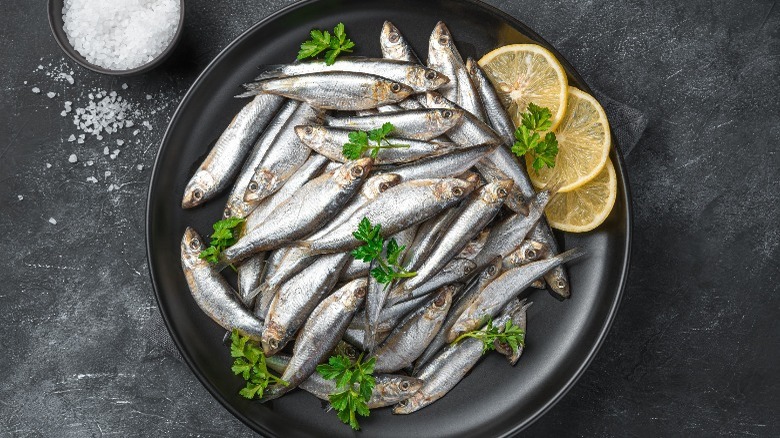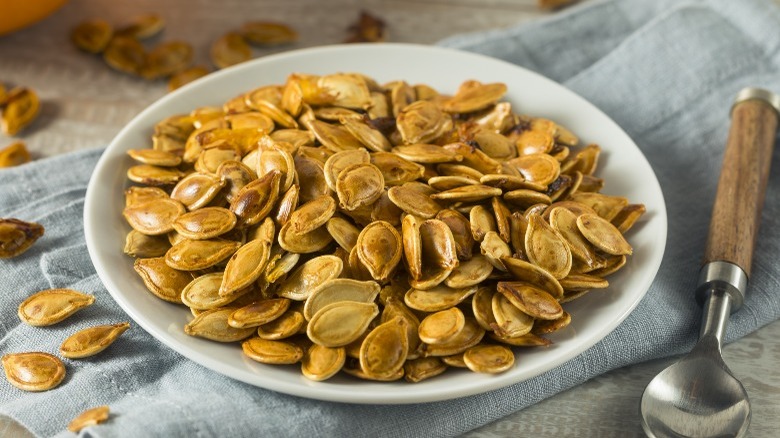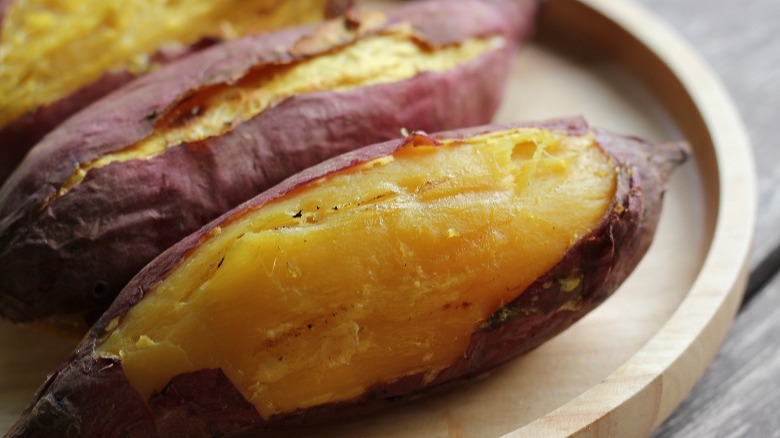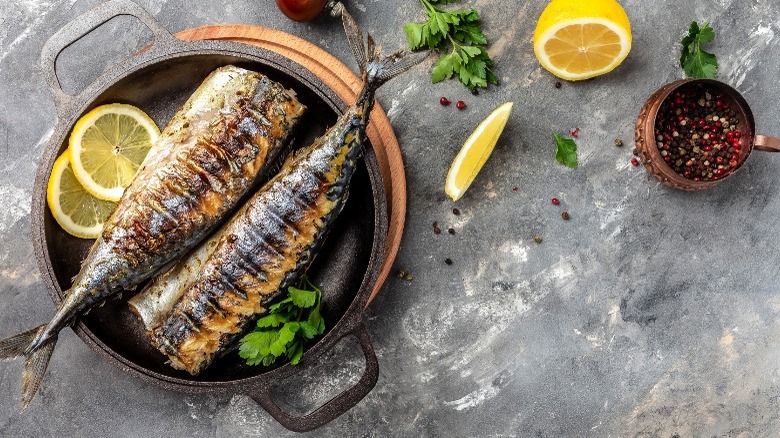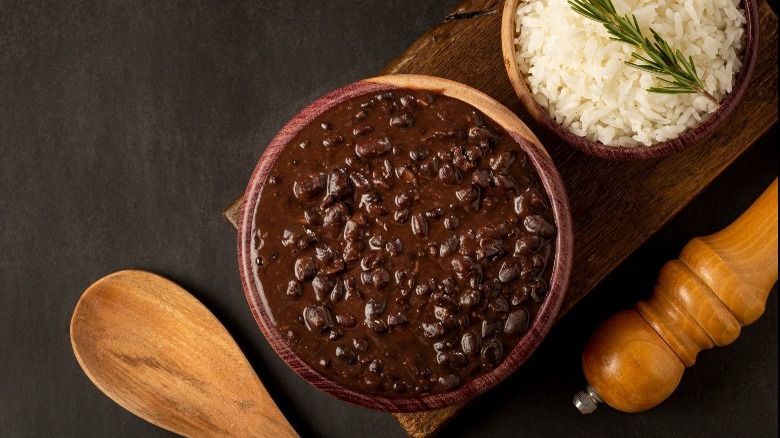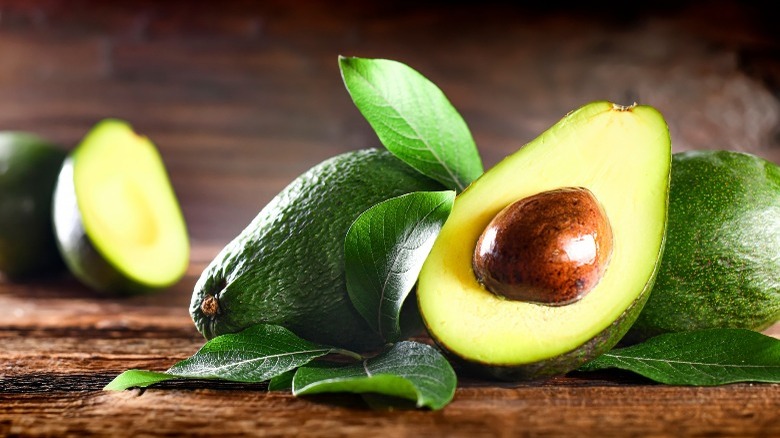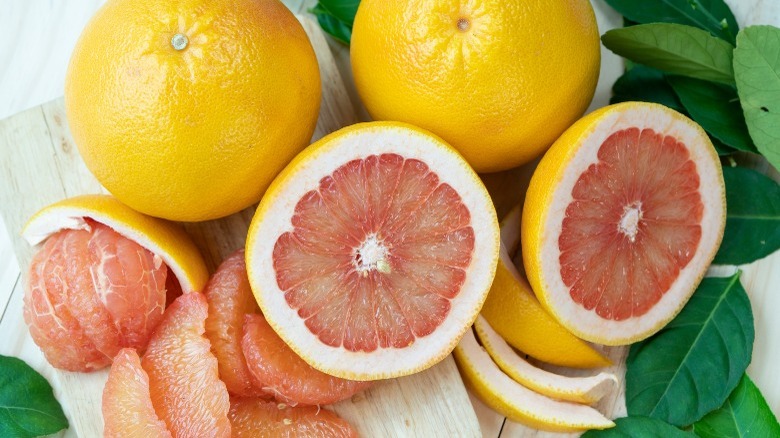13 Foods To Eat After Breaking A Bone To Help With Healing
Human bones are built to be surprisingly strong and can withstand an incredible amount of force. In fact, "Ounce for ounce, our bones are stronger than steel" (per Discover Magazine). However, while bones are tough, they are still susceptible to breaks — especially in those who have low bone mineral density (BMD) and other risk factors, according to American Bone Health.
Many people experience broken bones during their lifetime. Statistics show that 50% of all Americans will break a bone by the age of 65 (per WebMD). For those with weaker bones due to osteoporosis, there is an increased risk of fractures, including bones in the hips, forearms, and wrists, explains the Centers for Disease Control and Prevention (CDC). Although some broken bones are obvious, minor fractures may not be as apparent. Some symptoms of bone fractures include pain, swelling, tenderness, bruising, and being unable to move as usual (via the Cleveland Clinic).
The good news is that broken bones can heal. The American Academy of Orthopaedic Surgeons (AAOS) explains that our bodies create new bone cells that thread together to close the fracture. Depending on the severity of the fracture and your overall health, this process can take weeks to several months (per Medical News Today). However, there are things you can do to support your body's natural healing process. Here are 13 foods that may promote bone strength and healing after a fracture.
Dairy products
Milk, yogurt, eggs, and other dairy products contain several nutrients that help to build and maintain strong bones, including calcium and vitamin D. According to the U.S. Department of Agriculture (USDA), calcium and vitamin D improve bone health and prevent the development of osteoporosis in adults. Just one cup of vitamin D-fortified whole milk contains 300 milligrams of calcium, which is 23% of the recommended daily value, and 2.7 micrograms, or 14% of the recommended daily value, of vitamin D (via Nutritional Value).
Calcium is an essential mineral that the body needs to make up bones and teeth and carry out bodily functions (via MedlinePlus). According to the International Osteoporosis Foundation, 99% of the calcium in the human body is found in the bones. With such a crucial role in the formation of bones, it's important to get enough calcium to optimize bone strength. A study published in the Journal of Orthopaedic Research shows that calcium supplementation may improve the fracture healing process, particularly in osteoporotic bone.
In addition, an article in Nutrients shares that vitamin D supplementation can have a significant and positive impact on bone mineral density. The article also explains that vitamin D helps the body improve calcium absorption, lowers the risk of developing osteoporosis, and strengthens muscles, which can be beneficial to bone health (per Harvard Health Publishing).
Soy foods
Soybeans are a type of legume that is a good source of plant-based protein (via Medical News Today). They are versatile and can be prepared in a variety of ways, making them a popular ingredient for people who want to avoid animal products in their diet. You can find many soy foods on the market, including soymilk, tofu, tempeh, miso, vegetarian meat alternatives, and more (per UCSF Health).
A review in Therapeutic Advances in Musculoskeletal Disease explores the connection between strong bones and soy foods, and how they may be beneficial to overall bone health for several reasons. For one, the article states, "Soy foods contain varying levels of various types of isoflavones known to be weak plant-based estrogenic compounds or phytoestrogens." Estrogen is a hormone shown to have protective effects on bone mineral density and bone turnover (via Endocrine Society).
Soybeans are also rich in proteins, which are an essential nutrient for healthy bones and preventing loss of bone density, according to an article in the International Journal for Vitamin and Nutrition Research. Moreover, many soy milks are fortified with calcium and vitamin D. While adequate calcium levels build and maintain strong bones, vitamin D helps the body absorb the calcium to optimize the way the mineral is being used, according to EndocrineWeb. All these benefits may help during the bone fracture healing process.
Dark leafy green vegetables
Green leafy vegetables are packed with fiber, vitamins, minerals, and other antioxidants that are beneficial to overall health (per the USDA). In particular, vitamin K is found in abundance in kale, spinach, collard greens, and other dark leafy vegetables, which can have positive effects on bone health (via Bone Health & Osteoporosis Foundation).
A study published in Bone Reports found that green leafy vegetables can enhance bone metabolism and improve bone strength. Vitamin K activates certain proteins that are vital to the formation and mineralization of bone (via the Cleveland Clinic). Also, a study found in The American Journal of Clinical Nutrition shows that a deficiency in vitamin K is linked to an increased risk of hip fractures in women — and one or more servings of leafy greens per day can improve vitamin K levels.
If you're not a big fan of salads, there are other ways to get these bone-healthy vegetables into your diet. You can sautée hearty greens or add them to some of your favorite cooked dishes, including pasta or casseroles. Also, consider blending some spinach or kale in your morning smoothie for a boost of vitamin K.
Bell peppers
Bell peppers are more than just a colorful and tasty addition to a dish. They are excellent sources of key vitamins and minerals, including vitamins C, K, A, and potassium (per Healthline). Bell peppers are generally inexpensive and readily available in grocery stores in several colors and shades, such as green, yellow, orange, and red.
According to Medical News Today, bell peppers may be beneficial to bone health due to their high levels of vitamin C, which protects bone and cartilage cells. A review published in Current Drug Targets also shares study results that show vitamin C can help prevent bone loss and improve bone turnover.
Also, failing to consume the recommended daily intake of vitamin C may increase the risk of developing osteoarthritis, according to Medical News Today, which is a condition that causes joint inflammation, stiffness, pain, and bone deterioration (per the Mayo Clinic). Just one red bell pepper contains about 169% of a person's daily intake of vitamin C (via Healthline), making it one of the best natural sources of this crucial antioxidant.
Bell peppers are also high in vitamin K1, which, according to a study in The Open Rheumatology Journal, has been shown to maintain bone mineral density. Additionally, vitamin K can affect the formation of bone and activate the proteins involved in the process that strengthens bones (via the Cleveland Clinic).
Sardines
Sardines are small, oily fish with silvery skin that mainly eat plankton and live in large schools (via Britannica). While they are commonly consumed throughout Europe and Asia, they are less popular in America (per WebMD). You will most often find them in the United States canned in oil, water, or tomato sauce. Sardines have several surprising health benefits — one of them being a boost to bone health.
According to Medical News Today, sardines are rich in calcium, vitamin D, omega-3 fatty acids, and other beneficial nutrients. Because sardines are so small, they are usually eaten whole, including the skin and bones of the fish. The bones are an excellent source of calcium — and there's about 569 milligrams of calcium in one cup of drained sardines. A study found in the Journal of Orthopaedic Research shows that calcium is essential to bone fracture healing and strong bones.
Another way that sardines pack a bone-healthy punch is their vitamin D content. They are a natural source of vitamin D, which helps the body retain calcium to build strong bones (per Harvard School of Public Health).
Although you can eat sardines straight out of the can, you may want to explore recipes and creative ways to add this healthy fish to your diet if you're recovering from a broken bone. Many people like to toss them in salad, sautée them, add them to pasta dishes, or put pickled sardines on crackers as a snack.
Pumpkin seeds
If you're craving a salty or crunchy snack as you nurse a fractured bone, pumpkin seeds may be a great choice. Certain types of seeds are a good source of magnesium and phosphorus — both of which have been shown to support bone health (per American Bone Health). Pumpkin seeds provide a healthy boost of these important nutrients, along with other vitamins and minerals. One ounce of pumpkin seeds offers 40% of your recommended daily value of magnesium, with about 168 milligrams. You'll also get 349 milligrams of phosphorus, or 28% of the recommended daily intake (via NutritionalValue).
A review published in BioMetals shares that consuming the ideal amount of magnesium can help lower bone fracture risk and improve bone mineral density. In all the studies included in the review, the results showed bone benefits connected to magnesium. Healthline also adds that pumpkin seeds are an excellent natural source of magnesium, which aids in the process of forming and maintaining bones. Another article in Pediatric Nephrology shares how phosphorus boosts bone health by supporting mineralization and helping to generate new bone.
Roasted pumpkin seeds are a great addition to salads or used as a crunchy crust for fish or meat. You can also grind and mix them into soups, sauces, or baking batter to add a little extra magnesium and phosphorus to your diet.
Sweet potatoes
Sweet potatoes are a nutritional powerhouse providing several vitamins and minerals that may help support healthy bones (via Healthline). These vibrantly colored root vegetables are good sources of vitamin A, potassium, and manganese (per NutrionalValue). You can find them at grocery stores year-round and prepare them as a main course or side dish.
One sweet potato contains about 448 milligrams of potassium, which is a mineral that acts as an electrolyte in the body to regulate bodily functions (per MedlinePlus). A study in Osteoporosis International found that a balanced intake of dietary potassium had positive effects on BMD and bone health. The study goes on to explain, "Potassium may neutralize acid load and reduce calcium loss from the bone."
This popular orange vegetable also provides about 15% of the recommended daily intake of manganese (via NutrionalValue). According to a review in Natural Product Communications, manganese may play an essential role in bone collagen synthesis and bone mineralization, which is the process of strengthening the bone, as explained in an article in The Journal of Clinical Endocrinology & Metabolism.
Moreover, sweet potatoes pack a punch of vitamin A with an impressive 105% of the recommended daily intake (per NutrionalValue). Vitamin A is essential for building strong bones (per American Bone Health). However, research has shown that too much vitamin A may have adverse effects on BMD, so be sure to talk to your doctor about vitamin A levels as your broken bone heals.
Fatty fish
Fish that have higher oil content, including salmon and mackerel, are excellent natural sources of vitamin D, explains an article in The Journal of Steroid Biochemistry and Molecular Biology. Although the body is able to produce vitamin D with adequate sun exposure, many people are vitamin D deficient (per Healthline). Without enough vitamin D in the body, bones may begin to weaken, resulting in an increased risk of osteoporosis and fractures (via the Mayo Clinic). This is why getting enough dietary vitamin D is so important.
A 3.5-ounce serving of salmon clocks in at about 66% of your daily value of vitamin D, which is vital to overall bone health (via Healthline). Mackerel contains even more, with 76% of the recommended daily intake of vitamin D in a 3-ounce serving (per NutritionData). Trout, which is another nutritious fatty fish, provides 68% of the recommended daily value of vitamin D (per NutritionValue).
Grapes
Grapes can be a healthy snack at home or on the go. Available in red, green, and purple shades, grapes are a good source of several beneficial nutrients, including potassium, magnesium, phosphorus, vitamin K, and other key vitamins, minerals, and antioxidants (via Medical News Today).
One cup of raw grapes offers a portion of the recommended daily intake of bone-healthy nutrients, including 6% of potassium, 2% of magnesium, 2% of phosphorus, and 18% of vitamin K (via NutritionValue). According to Healthline, these nutrients found in grapes can have a positive effect on building strong bones and maintaining bone health. Vitamin K, in particular, can help boost the processes used for "bone formation and mineralization" (per the Cleveland Clinic).
Grapes also contain resveratrol, which is a polyphenol that acts as a strong antioxidant to protect the body (via WebMD). A study published in The Journal of Nutrition found that resveratrol can help with bone calcium retention, improve the way the body uses calcium, and increase bone quality. However, more studies are needed to determine the beneficial effects of resveratrol on human bones.
If you have a broken bone, snacking on grapes can provide vital nutrients that may help with bone health (via Healthline). You can also try adding grapes to grilled chicken or pasta salads or cooked into a sauce for meat or poultry.
Meat
Meat, including beef and pork, is an excellent source of protein, which is a major component of what makes up bone tissue (per the International Osteoporosis Foundation). Getting the right amount of protein may help the body build strong bones. An article published in International Journal for Vitamin Nutrition Research shares that protein can help improve bone mineral density, reduce the risk of bone fractures, and promote bone health.
Another essential nutrient found in meat is iron. According to the American Red Cross, meats like beef, lamb, pork, and veal, are rich in iron and provide a good amount of the recommended daily intake of this crucial dietary mineral. An article found in The Journal of Nutrition explains how iron is important for bone health and mineralization by supporting osteoblasts, which are the specialized cells that form bone tissue. Osteoblasts are activated when a bone is broken to initiate and carry out the bone healing process, as explained in an article published by the Federation of American Societies for Experimental Biology.
In addition, beef contains glutamine, which is an amino acid that may play a role in bone health (via Healthline). A review found in Stem Cells International shows that glutamine affects bone metabolism and regulates osteoblasts and osteoclasts — both of which are necessary for bone fracture healing.
Black beans
Black beans are legumes that provide potential health benefits when added to your diet (per Medical News Today). The vitamins and minerals found in black beans may help to strengthen and maintain healthy bones. One cup of cooked black beans provides an impressive array of a person's recommended daily value of several nutrients, including 30% of magnesium, 24% of phosphorus, 38% of manganese, 17% of potassium, and 13% of zinc (via NutritionData).
A review in BioMetals shares how magnesium promotes bone health by improving bone mineral density and overall strength. Similarly, phosphorus supports bone structure and the generation of new bone, according to an article published by Pediatric Nephrology. According to a review in Natural Product Communications, manganese also aids in bone mineralization and strengthens the bone's structure. Lastly, research in Materials shares that zinc helps to maintain bone elasticity and promote bone formation and regeneration.
With a variety of nutrients that help with bone health, consuming black beans may be a good idea if you have a broken bone. They're also a great vegetarian option if you're trying to avoid meat or fish.
Avocado
Avocados have gained popularity in America in the last few decades as a nutritious and tasty addition to the diet. According to recent statistics, the consumption of avocados in the United States has increased six-fold from 1985 at 436 million pounds per week to 2021 at nearly 3 billion pounds per week. Based on the health benefits of avocados, it's not surprising that more people have decided to indulge in this unique berry.
While avocados are an excellent source of fiber and B vitamins, they also provide 26% of the recommended daily intake of vitamin K in one raw avocado (per NutrionalValue). Vitamin K is vital to overall bone health by helping with bone mineralization and formation (via the Cleveland Clinic). American Bone Health also shares that low levels of vitamin K are linked to low bone density and an increased risk of bone fractures.
Additionally, one avocado offers 15% of a person's daily value of potassium (via NutrionalValue), a beneficial mineral that helps to regulate several functions throughout the body (per Healthline). However, potassium is also important to bone health. According to an article published in Osteoporosis International, potassium lowers the rate of calcium loss from the bones, which improves bone strength and density.
Grapefruit
Grapefruits are citrus fruits known for their tangy yet sweet flavor and vibrant color. Slightly larger than an orange, the grapefruit has a pink or red interior color, which makes it unique from other citrus fruits (via Johns Hopkins Medicine). This coloring reflects the presence of beta carotene, or vitamin A, which can be beneficial to bone health at the right levels (via American Bone Health).
Moreover, grapefruits are rich in other vitamins and minerals, including vitamin C, potassium, magnesium, and other nutrients that promote strong bones. In addition to being an immunity booster, vitamin C can help to increase bone density and prevent osteoporosis (per SpineUniverse). Similarly, potassium helps with bone mineral density by slowing bone calcium loss, according to an Osteoporosis International article.
Magnesium is another essential mineral you'll find in grapefruit. Providing about 27 grams of magnesium in one grapefruit, consuming this citrus fruit can help your body strengthen bones and improve BMD, notes an article in BioMetals.
Also, a study published in The Journal of Medicinal Food found that grapefruit juice had a significant and positive effect on the bone quality, density, and turnover of test animals. While these results may indicate more potential benefits of grapefruit, more testing is needed to confirm these effects in humans.

